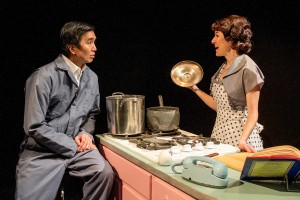A TWISTED TRIP DOWN MEMORY LANE
Imagine yourself transported back to 1955: Forming values in the image of Father Knows Best; solving family problems as cleanly as Ozzie and Harriet; and living in the perfect suburban community with like-minded neighbors. When compared to our complicated, isolating, 21st-century push-button lives, we may feel a nostalgic longing to return to those simpler times if only we could. Or can we?
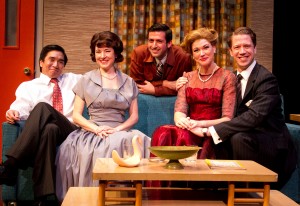 In Jordan Harrison’s Maple and Vine at Cygnet Theatre, Katha and Ryu get that chance. Sort of. Katha (Jo Anne Glover) is utterly burned out in her high-stress, 60+ hours-a-week job with Random House and cell phones that never stop ringing. Husband Ryu (Greg Watanabe) is just as worn out dealing with her depression as he is fed up with his career as a plastic surgeon for egotistical socialites. At a bus stop, Katha meets Dean (Jordan Miller), who is dressed like a page out of a mid-fifties Sears and Roebuck catalogue. When she questions his dated look, he explains that he manages a large community where all the inhabitants agree to pretend it is always 1955. Residents agree never to even mention modern conveniences of the 21st century in exchange for the peace that comes with simpler times. Katha is thrilled at the notion; Ryu takes more convincing.
In Jordan Harrison’s Maple and Vine at Cygnet Theatre, Katha and Ryu get that chance. Sort of. Katha (Jo Anne Glover) is utterly burned out in her high-stress, 60+ hours-a-week job with Random House and cell phones that never stop ringing. Husband Ryu (Greg Watanabe) is just as worn out dealing with her depression as he is fed up with his career as a plastic surgeon for egotistical socialites. At a bus stop, Katha meets Dean (Jordan Miller), who is dressed like a page out of a mid-fifties Sears and Roebuck catalogue. When she questions his dated look, he explains that he manages a large community where all the inhabitants agree to pretend it is always 1955. Residents agree never to even mention modern conveniences of the 21st century in exchange for the peace that comes with simpler times. Katha is thrilled at the notion; Ryu takes more convincing.
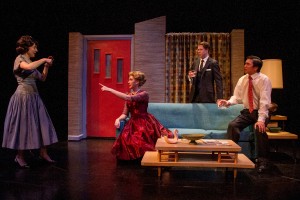 Act I alternates between two zones of scenes. Half of the act is dedicated to Katha and Ryu weighing the pros and cons of doing a six month trial in this alternate society. The other half presents Dean and his June Cleaver-esque wife Ellen talking directly to the audience; we are attendees at welcoming meetings where the curious can learn about how the community works. They give us the sales pitch for why we might be better off to leave 2014 for this agreed-upon lie that simply makes life better. From them, we learn about the expectations of dress, décor, interaction − even how great salt is as an alternative to all those modern spices: “And what’s a little hypertension if you’re happy?” beams the delightfully grand Amanda Sitton as Ellen, spruced exquisitely by Jeanne Reith on costume and Peter Herman on makeup and wigs.
Act I alternates between two zones of scenes. Half of the act is dedicated to Katha and Ryu weighing the pros and cons of doing a six month trial in this alternate society. The other half presents Dean and his June Cleaver-esque wife Ellen talking directly to the audience; we are attendees at welcoming meetings where the curious can learn about how the community works. They give us the sales pitch for why we might be better off to leave 2014 for this agreed-upon lie that simply makes life better. From them, we learn about the expectations of dress, décor, interaction − even how great salt is as an alternative to all those modern spices: “And what’s a little hypertension if you’re happy?” beams the delightfully grand Amanda Sitton as Ellen, spruced exquisitely by Jeanne Reith on costume and Peter Herman on makeup and wigs.
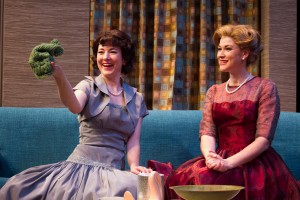 While story development is interesting in both scene zones, we develop a feeling of “Go to the community already!” by the end of the act. We thoroughly get that they’re burned out and that this is a tough decision. By the time they agree to give it a try, there isn’t as much time inside the community in Act II as we’d like. During intermission, one patron was overheard to say, “I’m tired of waiting for this comedy to get funny.” This is unfortunate because, besides the delay to getting to the meat of the plot, the cutesy logo for the show had probably given this patron the wrong impression: Maple and Vine is not really a comedy. It is, however, a very interesting light drama (which happens to draw laughs in some places) and Act II is when it has a chance to finally gel.
While story development is interesting in both scene zones, we develop a feeling of “Go to the community already!” by the end of the act. We thoroughly get that they’re burned out and that this is a tough decision. By the time they agree to give it a try, there isn’t as much time inside the community in Act II as we’d like. During intermission, one patron was overheard to say, “I’m tired of waiting for this comedy to get funny.” This is unfortunate because, besides the delay to getting to the meat of the plot, the cutesy logo for the show had probably given this patron the wrong impression: Maple and Vine is not really a comedy. It is, however, a very interesting light drama (which happens to draw laughs in some places) and Act II is when it has a chance to finally gel.
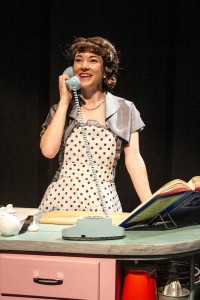 No surprise that when life is a lie, secrets bubbling beneath the surface can only be hidden so long. Unfortunately, whereas 1960s Mad Men creates exciting tension by the mere mention of a divorcee moving into the neighborhood, Maple and Vine doesn’t have enough time with just one act left to explore the subtleties of eyebrow-raising. Instead, big problems come up fast. Attention-grabbing titillation to be sure, and quite entertaining, but the opportunity to be suggestive is lost.
No surprise that when life is a lie, secrets bubbling beneath the surface can only be hidden so long. Unfortunately, whereas 1960s Mad Men creates exciting tension by the mere mention of a divorcee moving into the neighborhood, Maple and Vine doesn’t have enough time with just one act left to explore the subtleties of eyebrow-raising. Instead, big problems come up fast. Attention-grabbing titillation to be sure, and quite entertaining, but the opportunity to be suggestive is lost.
Acting teacher Keith Johnstone says in his book Impro Theatre that the reason people come to theatre is to watch people go through change; to our intrigue and amusement, Maple and Vine heeds Johnstone’s words in the second act: Ryu is Japanese-American, and some of the more pointed commentary comes with the residents figuring out how they should welcome their new mixed-race neighbors if they want to remain authentic to the illusion that the Japanese had been America’s enemy only ten years earlier. Under Igor Goldin’s direction, the character growth is portrayed in quality performances by Cygnet’s cast.
The audience was ready to applaud the penultimate scene, which would have made a great ending. Harrison goes one step too far, however, with one more scene that both adds little and ends on an awkward note. A shame, because in true 50s style we really would have liked our Ozzie and Harriett ending for this pleasant tale.
photos by Daren Scott
Maple and Vine
Cygnet Theatre
4040 Twiggs St. in Old Town San Diego State Historic Park
scheduled to end on February 16, 2014
for tickets, call 619-337-1525 or at http://www.cygnettheatre.com

